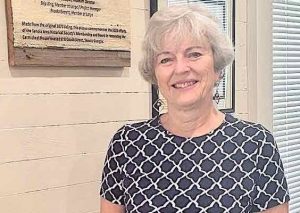There were no zombies at the Sept. 6 meeting of the Rotary Club of Coweta-Fayette, but “The Walking Dead” location manager Mike Riley with Stalwart Films spoke about the job of a location manager and offered a glimpse into the world of movie and television production.
The Atlanta native began work as a photojournalist and later worked with the emerging Ga. Dept. of Economic Development.
It was during those years that Riley learned how the public/private sector can interface successfully with local governments. Regardless the project, Riley said he quickly learned about the economic impact a production can have on a local economy and in the state.
Riley also spoke of the economic significance of having a production anchored in a given community.
“I got to see how the money is spent in a community,” Riley said, referencing his work with the hit TV show filmed in Senoia since 2010. “There’s no better example than ‘The Walking Dead’ during the past few years.”
The Walking Dead production has 40-50 vendors, Riley said. Of those, two-thirds are local companies, he added.
“We try to keep it local,” he said.
Riley also spoke of the disadvantages of having a production occurring in a community.
“The downside is having to close roads temporarily and re-route traffic,” Riley explained. “But it’s a small price to pay compared for the economic impact and the exposure of the community to people all over the world.”
Citing examples, Riley referenced people from Sweden, Hong Kong and Australia who have visited Senoia to see where the television series is filmed.
“This is worldwide and you couldn’t buy this kind of advertising,” Riley said with a smile.
Aside from the job that involves finding locations for the various shooting locations, Riley said he is an independent contractor with Stalwart Films and spends a great deal of time in the car searching for those locations.
Riley said production companies will often send a script which provides the type of information he needs to find and photograph multiple locations for potential use in the production. And during the process, the job requires interfacing with local governments to inquire about needed permits and other issues.
Once the decision to produce a project is made Riley will work to obtain the permits, such as the one that led to the construction of the15-foot wall that currently surrounds a portion of the Gin Property on the south side of downtown which will serve as a closed set for the production.
Yet another aspect of the job of a location manager is to liaison between the production company and the community. Riley noted that he has several staff which also provide that function.
“Coming up a freelance journalist out of college I understood not getting a regular paycheck. If there’s no project there is no paycheck,” Riley said, again with a smile.
Asked about his interaction with zombies, Riley said, “I don’t work with zombies but I have lunch with them.”
Aside from his work with Stalwart on “The Walking Dead,” Riley has served as location manager on numerous film projects, such as “Sweet Home Alabama” and “O Brother Where Art Thou?”
Riley also spoke about Georgia’s expanding presence in the world of film and television productions. He said it is the combination of geographic diversity and weather along with financial incentives that is putting Georgia a bit a head of Louisiana as the top production locations behind California.
“Film companies generate jobs and spending,” Riley said as he addressed Rotarians at their regular meeting location at the Senoia Coffee and Cafe, aka the Woodbury Coffee House.












Leave a Comment
You must be logged in to post a comment.